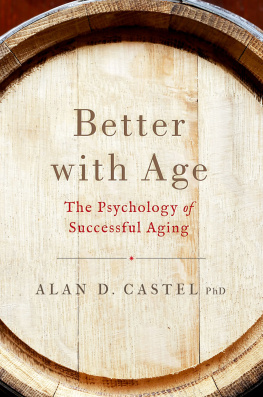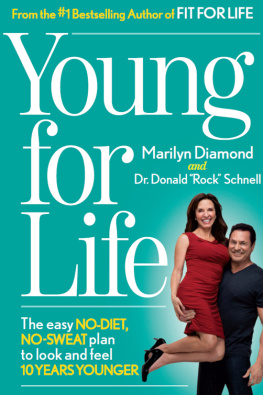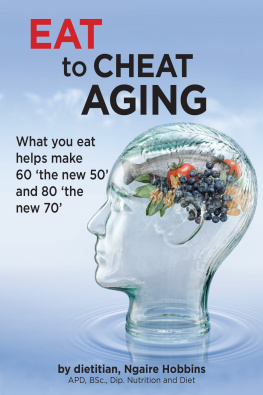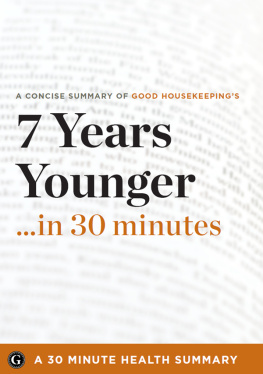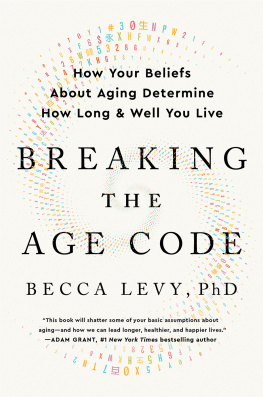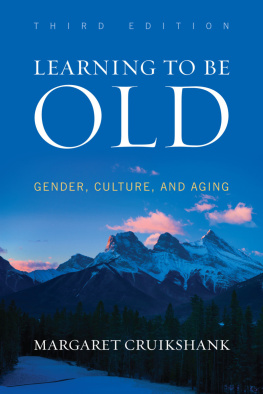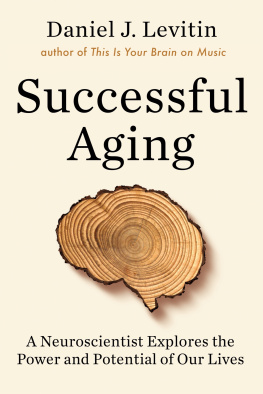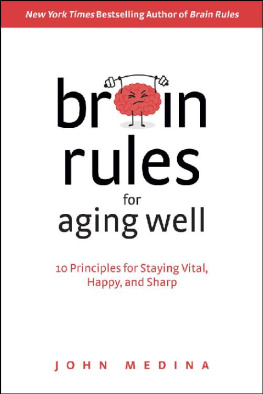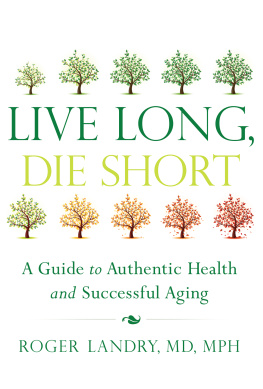If you think a book about aging cant be a fun and engrossing readthink again. Alan Castels Better with Age blends cutting-edge research with personal accounts from well-known Americans to create a roadmap for the later years. This engaging and inspirational book should be read by everyone who wants to know how to ensure a happy and healthy old age.
Karl Pillemer, Professor of Human Development, Cornell University and author of 30 Lessons for Living: Tried and True Advice from the Wisest Americans
Reading Better with Age, you will regret not having read it at an earlier age. Professor Castel combines the wisdom of remarkable people he interviewed, with the latest research findings, to provide a masterful guide to become better with age.
Moshe F. Rubinstein, Professor of Engineering and Business at UCLA, author of Extraordinary Outcomes, age 87
This evocative, compelling, insightful, thought provoking, readable, comprehensively researched book is a stunning celebration of not just aging but of all of life. As presented: age is no better or worse than youth, the 80s or 90s no better or worse than the 20s or 30s. Age is one of the phases of life, but like all phases, it must be mindfully lived differently. This symphony of life has been composed from a massive quantity of disciplined studies and powerfully expressive scenarios from real lives such that the reader can design custom tailored optimum phases for themselves. If only enough people would engage this thinking, the trajectory of the human species would be elevated into a new realm.
Story Musgrave, loving daddy to seven children, ages 57 to 11, grand-daddy to many, student of life, professor, pilot, trauma surgeon, astronaut on six flights
Better with Age

Oxford University Press is a department of the University of Oxford. It furthers the Universitys objective of excellence in research, scholarship, and education by publishing worldwide. Oxford is a registered trade mark of Oxford University Press in the UK and certain other countries.
Published in the United States of America by Oxford University Press
198 Madison Avenue, New York, NY 10016, United States of America.
Oxford University Press 2019
All rights reserved. No part of this publication may be reproduced, stored in a retrieval system, or transmitted, in any form or by any means, without the prior permission in writing of Oxford University Press, or as expressly permitted by law, by license, or under terms agreed with the appropriate reproduction rights organization. Inquiries concerning reproduction outside the scope of the above should be sent to the Rights Department, Oxford University Press, at the address above.
You must not circulate this work in any other form and you must impose this same condition on any acquirer.
Library of Congress Cataloging-in-Publication Data
Names: Castel, Alan D., author.
Title: Better with age: the psychology of successful aging / Alan D. Castel.
Description: New York, NY: Oxford University Press, [2019] | Includes bibliographical references and index.
Identifiers: LCCN 2017052747 | ISBN 9780190279981 (alk. paper) | ISBN 9780190280000 (epub)
Subjects: LCSH: AdulthoodPsychological aspects. | AgingPsychologicalaspects. | AgingSocial aspects.
Classification: LCC BF724.5.C37 2018 | DDC 155.67dc23 LC record available at https://lccn.loc.gov/2017052747
Contents
I learned to love old age early in life. I had one grandparent who celebrated with large birthday parties, and another who lied constantly about her age. My grandfather was very uninhibited and told me many funny and risqu jokes that I still remember to this day. My grandparents taught me my family history, sent chocolate in the mail, and showed me how to clean a penny in Coca-Cola. My early exposure to old age was filled with a cast of colorful characters.
As a child who grew up in Canada, I was able to escape many harsh winters by visiting my grandparents in sunny South Florida. Children were a cherished minority in the snowbird retirement community where we stayed each winter. My retired older relatives would take walks every day, visit orange groves, and rejoice in the warm, humid weather. Older adults taught me to play golf, chess, and shuffleboard. They also taught me when to yell at the TV while watching football. We would meet my older relatives at hotels and museums, often going out for early dinners and having ice cream. In my young eyes, old age looked pretty fun, literally like fun in the sun.
I used to have a great memory. In high school, I memorized all of the chemical elements in the periodic table. The names of those elements were mostly nonsense to me, so I just made up a catchy jingle to remember them. Was I good at chemistry, or simply good at memorizing? In college, I quickly forgot most of the chemistry I had memorized and learned that I had little interest in a deeper understanding of chemistry. Luckily, I took a class in psychology my first year of college, and discovered an interest in how we learn and why we forget. I learned about the scientific study of memory and aging and the booming field of gerontology. My early interest in older adults and aging was rekindled.
Our memories are our very identities, and my research at UCLA seeks to understand how we remember what is important to us, especially as we get older. As we age, we might actually get better at knowing what is important to remembersomething that college students often find challenging. The ability to remember what is important is essential in a world overflowing with enticing but useless information. Memory and aging go hand in hand, as memory decline is one of the first things that concern most people as they age. But changes in memory really happen over a lifetime. In my 40s, I sometimes struggle to remember names and where I put my wallet or sunglasses. But I am also struck by how many older adults vividly recall remote memories and what is most important to them, even if some names are forgotten on occasion.
People often think about old age in a negative light, in terms of aches and pains. But when does old age actually begin? A few years before I turned 40, I hurt my back. I had a herniated disk, the result of an ill-advised zip-line adventure. I felt shooting pain in my lower back and nerve sensations in my toes for months. I had to hobble around, sometimes hunched over. People told me I was just getting old. It probably didnt help that my hair was also thinning. My young daughters would say, Daddy, why are you walking like Grandpa? I would struggle with carrying my children, installing car seats, and lifting anything heavy. I wasnt exercising as much as I used to, and I was complaining more about my various aches. I lost my prescription sunglasses enough times that I now have my name and phone number engraved on them. Sadly, some of my once-close friends died unexpectedly. Was this an early taste of what to expect in older age? Why didnt getting older look like what I saw in sunny South Florida as a child?
Some people say you are only as old are you feel. I felt old when I started college, which in fact was a place where I often acted like a child. Later in life, my back injury led to people telling me I was getting old. I feel even older now that I have a mortgage. We learn as we grow older. I have learned from the people Ive interviewed about successful aging, as well as from the students and older adults who do our research studies at UCLA. I see many impressive role models of aging, as well as those who struggle in older age. Having studied aging for several decades, I know we are never too young, or too old, to learn about the effects of aging.

